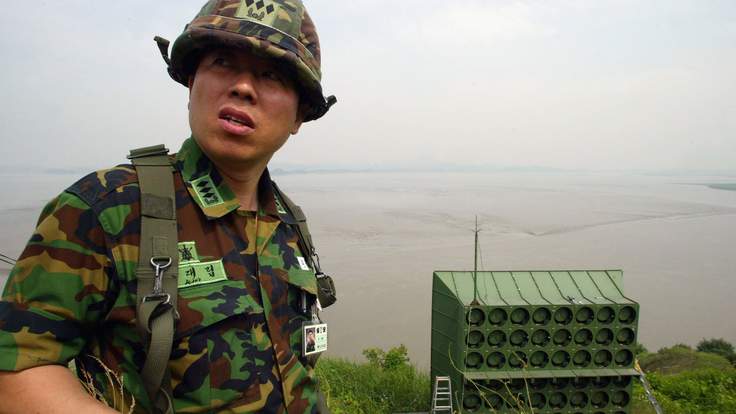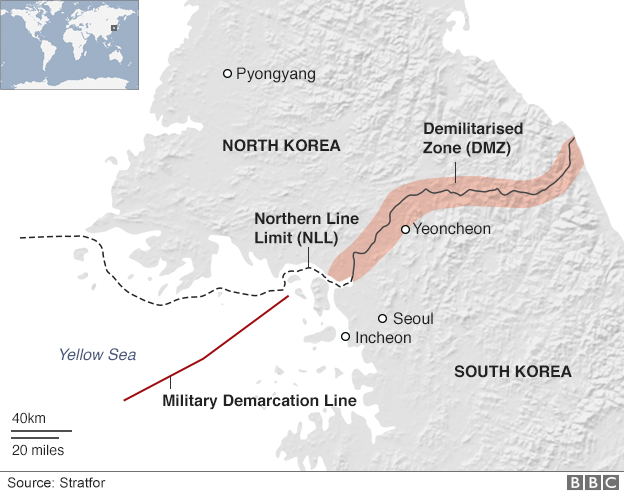Situation Breakdown
The mid-twentieth century war between North and South Korea never really ended; the countries never signed a peace treaty, and things have become rather tense as of late. Earlier this week, South Korea started blasting anti-Pyongyang propaganda via loudspeaker across the border in an aggressive response to a land mine attack – allegedly on the part of North Korea – in the Seoul-controlled southern region of the Demilitarized Zone (DMZ). South Korea’s suspicion over the mine attacks is backed by the US-led UN Command, who are indeed blaming Kim Jong-Un for the incidents. South Korean soldiers lost limbs in the attack, and this marks the first time in 11 years that Seoul has put forth anti-North Korea messages via the loudspeakers that currently line the border.
In 2004, the ‘cross-border propaganda battle’ involved not only broadcasts, but billboards and leaflets. The loudspeakers were dismantled, but were shortly rebuilt after a South Korean warship sank, resulting in the deaths of 46 sailors. Seoul has ominously stated that the broadcasts constitute merely one facet of their response to the land mine attacks. The country’s officers have asserted that they will not be pressed to determine how long the loudspeaker campaign will go on for.
On Thursday, North Korea blasted two shells over the border in response to the broadcasts. It is said that the first North Korean shell landed in an area approximately 60 km north of Seoul in the western part of the border zone. Almost 800 South Korean residents living nearby were forced to evacuate to shelters.
The South retaliated by firing approximately 36 155mm artillery rounds.
Washington has urged Kim Jong-Un to cease all “provocative” actions against the South. North Korea did not return fire, but instead wrote a letter to the South Korean government explaining that it would take military action if the broadcasts did not cease within 48 hours. In a second letter, Pyongyang stated that it is willing to resolve the issue despite considering the broadcasts a “declaration of war”.

The loudspeakers that were originally dismantled in 2004.
What’s Happening Now?
Fortunately, there have not been any reported injuries or casualties in wake of the firings.
The broadcasts have not relented, and last night, Kim Jong-Un warned that his country’s military may attack the South from 5pm today onwards. It was reported that he ordered his army to be ‘fully ready for war’ following the fire exchange, and has since declared a ‘quasi-state of war’.
South Korea’s President Park Geun-hye was quoted as telling her officials to “react firmly” to all of North Korea’s actions. At the time, the South Korea’s Defence Ministry commented: “Our military has stepped up monitoring and is closely watching North Korean military movements”.
The United States, which has approximately 28,500 military personnel in South Korea, expressed great concern over the situation. US State Department spokesperson Katina Adams said: “Such provocative actions heighten tensions, and we call on Pyongyang to refrain from actions and rhetoric that threaten regional peace and security.” The Pentagon has also reportedly alluded to taking “prudent measures” to ensure the safety of US personnel, but did not speak further on the issue.
What’s Next?
North Korea has officially warned Seoul that if it does not remove its loudspeakers from the border by 5 p.m. tomorrow evening, further military action will ensue.
South Korea has prepped its military in response, and is apparently “ready to repel any additional provocation” according to Chief of Staff spokesman Jeon Ha-kyu. The North’s media report disclosed that “military commanders were urgently dispatched for operations to attack South Korean psychological warfare facilities if the South doesn’t stop operating them.”
This could very well mean that the North will attack the 11 South Korean broadcasting sites.
Kim Jong Un’s grand declaration of war on Friday isn’t unlike North Korea’s previous war discourse, which has reportedly included repeated threats to reduce Seoul to a “sea of fire”. It is said that South Korean citizens are by in large quite derisive of North Korea’s threats. However, because the North has indeed unleashed military force on the South this week, the aggressive threats are worrying this time. This is because South Korea appears to be completely undeterred from backing down, and a full-blown war could potentially ensue as a result.



